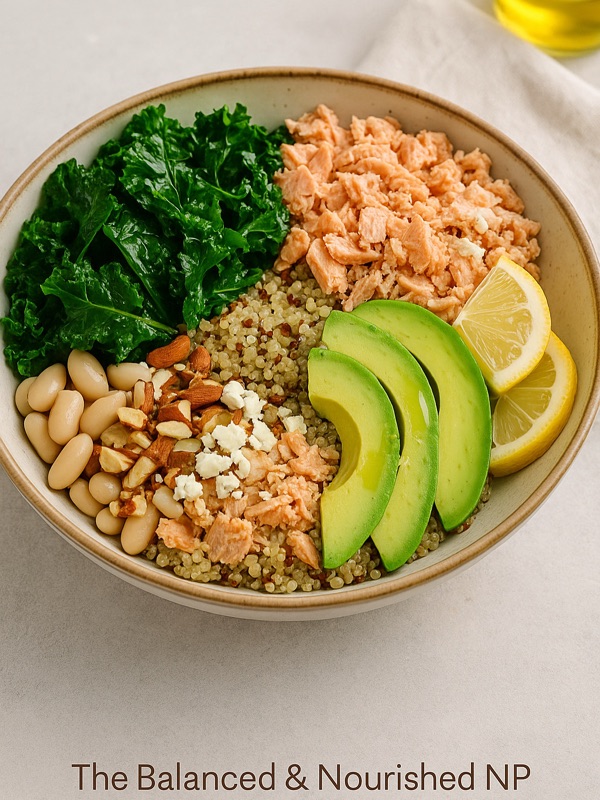🦴 Why Calcium Matters in Menopause and Perimenopause
 🦴 Why Calcium Matters in Menopause and Perimenopause
🦴 Why Calcium Matters in Menopause and Perimenopause
By Gina Cuneo-Ramos, FNP | The Balanced and Nourished NP
Hormonal shifts during perimenopause and menopause bring many changes—some expected, others not-so-welcome. One of the most overlooked consequences is the loss of bone density, which increases the risk for osteopenia and osteoporosis. That’s where calcium steps in as a key player.
Let’s break down why calcium is essential during this stage of life and how to make sure you’re getting enough.
🌿 The Hormone-Calcium Connection
During perimenopause and menopause, estrogen levels decline, and this impacts bone remodeling—the process that keeps bones strong. Estrogen helps the body absorb calcium and prevents calcium loss. When estrogen drops:
- Calcium absorption decreases
- Bone breakdown accelerates
- Risk of fractures and bone thinning rises
This makes calcium not just important, but critical for women in their 40s, 50s, and beyond.
💡 How Much Calcium Do You Need?
According to the National Institutes of Health, women over age 50 should aim for:
- 1,200 mg of calcium daily
But here’s the catch—your body only absorbs about 500-600 mg at a time, so spacing it out over meals is ideal.
🥦 Best Food Sources of Calcium
You don’t need to rely on supplements alone. Whole foods often provide better absorption and additional nutrients like magnesium, vitamin K2, and vitamin D, which support calcium’s function.
Try incorporating:
- Dairy: Plain Greek yogurt, kefir, cheese
- Leafy greens: Kale, bok choy, collard greens
- Calcium-set tofu
- Sardines and canned salmon (with bones)
- Fortified plant milks (unsweetened almond, soy, or oat)
- White beans, chia seeds, almonds
📝 Balanced and Nourished Tip: Pair calcium-rich foods with vitamin D (like eggs, salmon, or a few minutes of sun exposure) for better absorption.
🧴 Calcium, Skin & Beyond
Calcium also plays a lesser-known role in skin health. As estrogen declines, calcium loss from the skin contributes to dryness and thinning. Ensuring adequate calcium may help maintain skin barrier function—especially when paired with a good skincare routine.
💊 What About Supplements?
If you don’t meet your needs through diet, a calcium citrate or calcium carbonate supplement may be appropriate. But:
- Don’t exceed 2,000 mg/day
- Take in divided doses
- Avoid taking calcium at the same time as iron supplements or thyroid meds
Always speak with your healthcare provider—especially if you have a history of kidney stones, cardiovascular issues, or digestive problems.
💃 Keep Your Bones Strong: It’s Not Just About Calcium
- Strength training 2–3x per week
- Vitamin D (through sun or supplements)
- Magnesium and vitamin K2 for calcium utilization
- Avoid smoking, excess alcohol, and sugar, which weaken bones
🥗 Calcium-Boosting Salmon Kale Bowl
A protein-packed, bone-loving bowl full of flavor, fiber, and healthy fats
🧾 Ingredients (Serves 2)
- 1 (6 oz) can wild salmon, with bones (adds ~230 mg calcium)
- 4 cups kale, chopped (steamed or massaged raw)
- ½ cup cooked quinoa or farro
- ½ cup canned white beans, rinsed and drained
- ¼ cup chopped almonds (or pumpkin seeds)
- ¼ avocado, sliced
- 2 tbsp feta cheese or dairy-free alternative
- Juice of ½ lemon
- 1 tbsp extra virgin olive oil
- Sea salt, pepper, and garlic powder to taste
🥣 Directions
- Prepare the kale: Massage raw kale with lemon juice and olive oil (or steam it lightly to reduce bitterness).
- Assemble the bowl: In each bowl, layer kale, quinoa/farro, white beans, and flaked canned salmon (with bones).
- Top with sliced avocado, almonds, feta, and a sprinkle of seasonings.
- Drizzle with more lemon juice or a light vinaigrette.
🩺 Why This Recipe Works:
- Salmon with bones = excellent source of absorbable calcium + omega-3s
- Kale and beans = plant-based calcium + fiber
- Almonds and feta = calcium + healthy fats
- Quinoa = protein + magnesium (supports calcium balance)
✅ Takeaway
Calcium is not just for kids—it’s vital for women in perimenopause and menopause to maintain strong bones, resilient skin, and overall vitality. Start by checking your diet, moving your body, and getting the support you need.
Because thriving in midlife starts with caring for your foundation—from the inside out.
Disclaimer:
This blog post was formatted with the assistance of AI technology; however, all content and ideas presented are original and authored by me.
Comments
Post a Comment